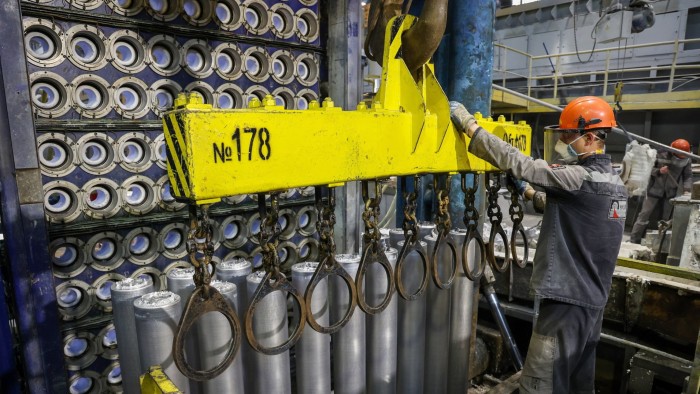Stay informed with free updates
Simply sign up to the Russian business & finance myFT Digest — delivered directly to your inbox.
Rusal has threatened to sue Germany for “unlawful expropriation” after the Russian aluminium giant was ordered to pay €213mn to liquidators of the European operations of Russia’s VTB bank.
At the centre of the dispute is an arrangement under which a Rusal subsidiary hedged its exposure to rouble currency fluctuations.
The world’s third biggest aluminium maker alleged that German regulators “substantially destroyed” the rouble hedging deal between the Rusal entity and VTB in the fallout over Russia’s invasion of Ukraine, in a letter to German Chancellor Olaf Scholz seen by the Financial Times.
In the letter dated March 20, Rusal demanded “full compensation” and alleged that Germany “breached the substantive protections” it was due under a bilateral investment treaty.
The aluminium group is already fighting to avoid paying the €213mn in a Jersey court — where its subsidiary RTI is based — after losing an arbitration case over the hedging agreement last year.
The legal wranglings highlight how sanctions are still complicating debt enforcement against Russian companies years after Russia’s invasion of Ukraine, and as Donald Trump’s rapprochement with the Kremlin is raising the prospect of sanctions being lifted in a ceasefire.
Following Russia’s invasion of Ukraine in 2022, the Rusal subsidiary received a series of margin calls from VTB’s European arm — now renamed OWH — which it refused to pay on the grounds that it believed this would breach sanctions, according to the Jersey court documents obtained by the FT.
A London arbitration tribunal last year sided with OWH and awarded it the €213mn.
RTI, the Rusal entity, is now seeking to challenge the enforcement of that award in Jersey, arguing that Jersey sanctions policy should prevent it from having to pay out the sum, according to the court documents.
RTI has argued that if the Royal Court in Jersey were to allow enforcement it would be “approving the penalisation” of RTI — which is not sanctioned — to the benefit of the subsidiary of a sanctioned entity.
Frankfurt-based OWH was ringfenced from its sanctioned Moscow-based parent VTB in 2022, and has since been put into liquidation.
As part of the liquidation process, OWH, which is not sanctioned, has been seeking to claw money back from VTB’s borrowers worldwide, including a claim of default against the African nation of Angola.
Allowing the enforcement of the €213mn arbitration award would further result in a “massive windfall” payment to OWH’s liquidators, RTI has argued in its Jersey challenge.
VTB said it was not responsible for any actions taken by the management of OWH. “These actions, which we consider as illegal and ungrounded, absolutely don’t coincide with our interests and, in some cases, contradict them.”
The German Ministry of Finance, Rusal and OWH declined to comment.
https://www.ft.com/content/e7863087-165e-43b3-ba57-7a5f6cc76f22


